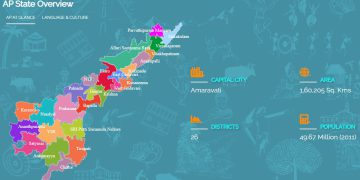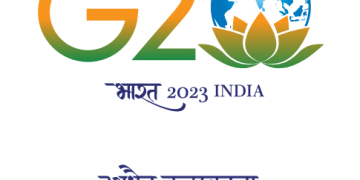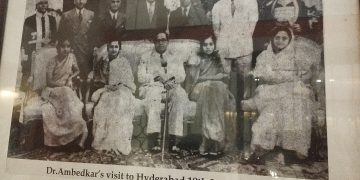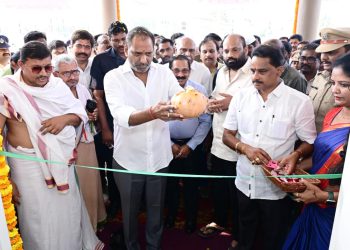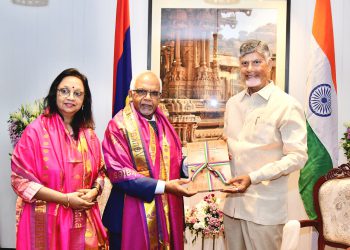Fact Check on CLIPPING IN EENADU ON 19.11..2023
A news item with the caption AMUL KOSAME PAALA VELLUVA was published in the Eenadu Telugu Daily News Paper on 19.11.2023 in which it was alleged that the Govt., is utilizing the Mahila Dairy Sahakara Sanghams and the Bulk Milk Cooling Units for the benefit of AMUL that vacant sites are being given for establishing milk parlours that loans under Cheyutha scheme are being given to women under agreement to pour milk to AMUL only, that despite all the efforts, could procure only 2.75 lakh litres of milk per day Chittoor Dairy was handed over to AMUL and is making efforts to handover the Ongole Dairy Plant to AMUL that till date about Rs. 10,000 Crores were unnecessarily spent under Paala Velluva scheme.
In Andhra Pradesh a strong Cooperative setup was created with help of AP Cooperative Societies Act, 1964. The Andhra Pradesh Dairy Development Cooperative Federation Ltd., (APDDCF) at state level, District Milk Unions at district level and Primary Cooperative Societies at village level were created to run the Dairy Development Activities under 3-tier cooperative structure on Anand pattern with an objective to organise milk production, to augment the income of dairy farmer and to meet the increasing demand for milk from semi-urban areas through primary milk cooperatives for economic development of the farming community. With the help of UNICF, under various development schemes such as Integrated Milk Project and Operation Flood, large infrastructure base was created.
Due to the enactment of AP Mutually-Aided Coop Societies Act (1995), Milk Unions were gone out of the Coop fold. most of the District Milk Unions have got converted themselves into MACS Act, 1995 initially (Guntur Union – 01.02.1997, Visakha Union – 07.08.1999, Krishna Union 07.10.2001, Prakasam Union 14.11.2002, Nellore Union – 16.10.2002, and Kurnool Union – 30.10.2002) and later some of them have gone further by way of incorporating under Indian Companies Act, 1956 (Guntur Union – 18.06.2013, Visakha Union – 06.01.2006, and Prakasam Union 13.02.2013) and all of the dairy units have gone out of purview of APDDCF.
Subsequently, several private players have also entered into the milk business and as a result there was no proper regulation on the price payable to the dairy farmers for the milk procured.
In 2014, The Andhra Pradesh Re-organisation Act was enacted. As per the A.P. Re-reorganisation Act, 2014. The State of Andhra Pradesh has been bifurcated into Andhra Pradesh and Telangana States.
The state of Telangana has registered a separate Federation in the name and style of The Telangana Dairy Development Cooperative Federation Limited at Hyderabad with the area of operation of the state of Telangana and has stopped accepting milk from the districts of Andhra Pradesh. This has resulted in forced reduction of procurement of milk from farmers which made the milk pourers to shift to private operators and were exploited by those private players.
In 2014, APDDCF was procuring 2,30,000 litres of milk per day in Andhra Region. But, as a result of losing the Hyderabad market, during the year 2016 to 2018, the procurement came down to 30,000 litres of milk per day and APDDCF and its ancillary units became sick and are unable to pay salaries to its employees.
The vast infrastructure base including the Milk Processing Plants, Milk Chilling Centres and Bulk Milk Cooling Units established with Crores of rupees of public money remained un-utilized and idle.
Hence, after 2019, Government has taken a stand to ensure socioeconomic upliftment of milk producers in Andhra Pradesh with special focus on economic empowerment of women, strengthening of overall dairy development activities, providing remunerative milk price to milk producers, availability of quality milk and milk products at value for money to consumers in the state.
As part of the prestigious NAVARATNALU programme and to see that the promise made by the Hon’ble Chief Minister during his paadayatra that steps would be taken to see that the milk pourers get Rs. 4/- per litre as additional benefit, to handhold the dairy activities through women dairy cooperatives in the state and to emulate the 3-Tier Cooperative structure and to ensure efficiency, transparency, and swiftness in functioning of the societies, the State Government has entered strategic partnership with Gujarat Cooperative Milk Marketing Federation (Amul) on 21.07.2020 as a marketing partner to fetch best possible price for the milk produce and collected through the primary milk cooperatives.
It is clarified that in the 1st phase Govt., is planning to spend Rs. 680 Crores for construction of Bulk Milk Cooling Centres under MGNREG Scheme and for establishment of AMCUs and BMCUs in villages to increase procurement of quality milk. This step is taken to assist the Mahila Dairy SahakaraSanghalu(MDSS) for their revival and to enhance the co-operative spirit among the dairying farmers. This will be handed over to the MDSS for maintenance. Since Amul is paying remunerative price to the milk procured once in every 10 days cycle directly into their bank accounts the dairying farmers would get maximum price for the milk poured by them, the Automatic Milk Collection Units (AMCU) are being installed to support these MDSS in collecting the quality milk and to get the remunerative price for the milk produce.
MDSS being registered under the provisions of AP Cooperative Societies Act 1964, to become viable, self-sustainable and to fetch the better price payable to the women dairying farmers duly eliminating the middle-men management in the milk procurement process and to check the adulteration of milk in un-organised manner, steps have been taken by the Government to handhold the activities dairying activities right from the Cattle Management, Farm Management, Good Handling Practices, Production of Quality Milk and to Collect the Quality tested milk for ensuing to get the wholesome milk & milk products to the consumers at value for money.
Prior to inception of Jagananna Paala Velluva (JPV) project, different stakeholders used to increase the procurement price on an average of once in two years. The following was the average announced price for procurement of litre of milk by different stakeholders in the state.
| Sl.
No |
Name of the District | Prior to inception of JPV (Rate /Ltr. (in Rs.)) | |||
| Milk Unions | Private Dairies | ||||
| Buffalo Milk (10% Fat & 9% SNF) | Cow Milk (5% Fat & 8.5%SNF) | Buffalo Milk (10% Fat & 9% SNF) | Cow Milk (5% Fat & 8.5%SNF) | ||
| 1 | Anantapur | 62.00 | 33.92 | 60.00 | 34.58 |
| 2 | Chittoor | 62.00 | 33.92 | 60.00 | 34.58 |
| 3 | East Godavari | 55.00 | 27.53 | 63.00 | 29.26 |
| 4 | Guntur | 62.50 | 31.92 | 64.00 | 31.26 |
| 5 | Krishna | 65.40 | 31.26 | 64.00 | 31.26 |
| 6 | Kurnool | 58.00 | 29.26 | 58.00 | 29.26 |
| 7 | Prakasam | 65.00 | 31.92 | 61.50 | 31.26 |
| 8 | SPR Nellore | 61.50 | 29.26 | 64.00 | 31.26 |
| 9 | Srikakulam | 63.00 | 29.26 | 64.00 | 31.26 |
| 10 | Visakhapatnam | 63.00 | 29.26 | 64.00 | 31.26 |
| 11 | Vizianagaram | 63.00 | 29.26 | 64.00 | 31.26 |
| 12 | West Godavari | 60.00 | 27.93 | 63.00 | 29.26 |
| 13 | YSR Kadapa | 62.00 | 33.92 | 64.00 | 31.26 |
With the implementation of the JPV Project and expanding the milk procurement network in phased manner, the women dairying farmers are able to get the better price to the milk produce and gaining the confidence to make better livelihoods, as a result the following is the resultant increase in farmers association and constant increase in milk procurement under JPV Project.
Under the Jagananna Paala Velluva scheme, the procurement activity was undertaken initially in 400 villages with 2,000 litres of milk per day which reached to 4,114 villages with 2,84 lakh litres of milk per day. During 1st to 10th of November, 2023, the milk procurement activities are undertaken in 4,113 milk potential villages with the active participation of 3,73,850 women dairying farmers who poured a total of 22,38,055.27 litres of milk which comes to an average of 2,73,806 litres of milk procurement per day. Further, during 11th to 18th of November, 2023, the milk procurement activities are undertaken in 4,114 milk potential villages with the active participation of 3,74,471 women dairying farmers who poured a total of 22,78,041.93 litres of milk which comes to an average of 2,84,755 litres of milk procurement per day. So there is a considerable increase in the milk procurement activity.
As a market intervention initiatedby the Govt., besides revival of dairy cooperative sector in the state, Amul has increased the procurement price for seven times during a span of 18 months. As a result, procurement prices have increased by Rs. 16.09/- per litre for Buffalo Milk and Rs. 8.36/- per litre for Cow Milk. This is more than the Rs. 4/- per litre excess as promised. This has compelled all the stake holders in the state to increase milk procurement price for their existence. With this, an amount of Rs. 2,604.06 Cr., was received by the dairying farmers as additional benefit.Further, Amul is paying a loyalty bonus of Rs.0.50/- per litre of milk poured at the end of each year. During the past 18 months Amul has distributed 2,235.45 Metric Tonnes of quality feed at a no-profit price.
Milk pourers are able to get working capital loan of up to Rs. 30,000/- per head as short-term loan to meet the finances required for maintenance of animals. Milk pourers are being provided with milch animals as per their requirement under CHEYUTHA Scheme. Since the loans are being disbursed through APCOB, as a precautionary measure for collecting the loans sanctioned to the beneficiaries, APCOB is taking steps to see that the dairying farmers pour milk to AMUL so that they would recover part of their loan sanctioned once in ten days when AMUL make payment for the milk poured by the beneficiaries. Government has nothing to do with the loaning or recovery process and it is the prerogative of the bankers to collect the loans issued.
Since it is the endeavour of the Govt., to revive the milk cooperatives and to empower the women dairying farmers, Govt., has decided to lease out the dead and un-utilized assets of the dormant milk unions to AMUL. As part of the strategy, AMUL came forward to invest Rs. 300.00 Cr., in Chittoor and hence, part of the Chittoor Dairy lands which were under liquidation were given on lease to AMUL. In the same manner, AMUL came forward to invest Rs. 400.00 Cr., in the Ongole dairy plant. Since Ongole Dairy was closed down due to recurring losses and since the plant & machinery of Ongole Dairy are not being utilized, in order to see that the unutilized assets are kept to optimum utilization, discussions in this regard are on the way for leasing out the Ongole Dairy plant and lands to AMUL. This will directly and indirectly induce employment avenues and will help the socio economic development of the region.
Govt., is not spending any amount beyond the scope of the MoU entered into between the Govt. of A.P., and the AMUL during the year 2020, Govt., through APDDCF is supporting the newly formed Mahila Dairy Sahakara Sanghalu – MDSS (Women Managed Dairy Cooperative Societies under APCS Act 1964) with the quality testing equipment and milk cooling units to fetch with the best quality of milk procurement and to avail the best possible price for the milk poured by the dairying farmers. So far, Rs. 66.01 Crores were only released by the GoI towards strengthening of village level milk procurement, testing and chilling activities and the arrangements made were will be the sole property of the APDDCF then by the MDSS.
Government not spending any money on the dairy plants but is it Amul Dairy that is investing Rs.385.00 Crores in Chittoor Dairy and for establishment of State-of-the-Art dairy plant in Chittoor and Rs.400.00 Cores in Ongole dairy for up-gradation of existing dairy plant in Ongole, which would benefit the Dairy Farmers of not only those two districts, but also adjoining districts directly and indirectly by way of better remuneration for their milk.
Government agencies take an active role in determination of milk pricing and minimizing price volatility. The milk producers have little influence in pricing decision and unless a Government agency or Cooperative agency are in play, the price received varies from farmer to farmer depending on demand of private players. The prices paid by milk co-operatives are higher than those paid by private players. Government agencies and the co-operatives play an important role in securing fair price to milk producers, in providing various inputs and services to them. Presence of Amul, being a big Dairy Cooperative enables better markets and price. Manufacturing and marketing infrastructure being established at huge investments would also enable farmers to earn better prices. Amul ensured year-round and dependable market at remunerative price for dairy farmer’s milk and incentives to increase milk production and reduction in seasonal price variations have enabled the farmers to enjoy the fruits of their labour instead of surrendering most of the profit to corrupt and exploitative private players.





